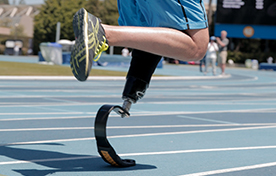Top 10 Tips for Growing Up as an Amputee
– by Melissa Shaw, Beau LaFave, Mia Lax, Li Jackson, Nicole Fuller and Debra Gardner
1. It gets easier.
Whether you were born missing a limb or you became an amputee later on, you can count on one thing: It will get easier as you get older. You’ll get used to it and you’ll find most people are more accepting of your difference. In fact, that difference becomes more and more a part of what makes you you.
2. Your attitude will affect how others perceive and treat you.
There’s no getting around the stares and questions. People are going to be curious. The more comfortable, relaxed and confident you are with yourself, the more others will treat you with respect. A quick matter-of-fact explanation puts others at ease, and once they know your story, they’re likely to stop focusing on your arm or leg. In fact, once people get to know me, they often “forget” about my arm (and try to hand me stuff, for example).
3. Give yourself permission to feel what you feel – being different isn’t always fun.
No matter how positive and well-adjusted you are, you’re likely to have moments when you just don’t feel like answering questions. I’ve had plenty of times when I was irritated by people’s ignorance and rude questions. I still get annoyed at the airport when I have to go through extra screening, and I don’t like it when people react to my arm with overflowing pity and apologies. (Sometimes I’ll be writing or carrying something and someone will ask, “What’s wrong with your arm?” When I say it’s a prosthesis, they’ll say things like, “I am so sorry. That must be horrible for you!”) The truth is, that stuff does get to me sometimes, and it can be a bummer to deal with physical pain, such as heat rash. I’ve found that I feel a lot better when I talk to my friends or family and just give myself permission to feel sad or frustrated. Those feelings won’t last, and it’s just plain lonely to act like nothing ever bothers you.
4. Don’t limit yourself.
It may sound corny, but there’s really nothing you can’t do if you’re persistent enough and determined enough. Whether it’s a sport, a hobby or a job you want, there’s a way to make it happen. You may have to do some research and try different approaches, but you can find a way to pursue anything that interests you. There are great resources (like the Amputee Coalition) and people who are willing to help modify equipment or tools for you if you seek them out. Don’t sell yourself short by not trying.
5. You have nothing to prove.
As much as it helps to know you can pursue any activity or sport you want, it can also be exhausting to go through life feeling like you’ve got something to prove. Everyone loves stories about people who triumph over adversity and do the impossible. But, honestly, there’s nothing you need to do to “make up for” your difference. All you need to do is be yourself and pursue your own dreams. Who knows, maybe you will inspire others in the process without even trying. As Christopher Reeve said, “A hero is an ordinary individual who finds strength to persevere and endure in spite of overwhelming obstacles.”
6. Tell your family and friends how to support you.
Chances are that your parents, siblings or friends may try to read your mind and guess how you want to be treated. They may act like nothing at all is different or they may do a lot of things for you. At different times you’re going to need and want different kinds of support. You can help by telling them how to help. My dad always went out of his way to treat me like any other kid (which I appreciated). But there were a couple of times when he lost sight of what I wanted in his eagerness to make things “normal” for me. Once he took me on a water-skiing trip and spent half the day trying to help me get up on the skis. I got a face full of water and one very sore arm. I’m sure if I really wanted to, I could have learned to be an excellent one-armed water-skier, but I was having fun just hanging out and getting towed around on an inner tube. He didn’t realize it, but he was pushing more for the sake of other people than for me. It took a while for me to learn to speak up in those situations, but it was worth it. It’s especially hard to say something to the people who love you and only want to help, but they will appreciate the direction.
7. Only you can decide if a prosthesis is right for you.
It never ceases to amaze me how opinionated people are about prostheses, especially when they aren’t amputees! I’ve had people tell me everything from, “If I were you, I wouldn’t care if I looked different! I’d never wear a fake arm!” to “If I were you, I’d get a bionic arm and never take it off!” Only you can decide if a prosthesis makes things easier or harder for you. It’s different for everyone. You may even find yourself changing your mind at different times or for different activities.
8. People who don’t accept your difference are not worth your time.
I can count on one hand (and not just because I only have one hand) the number of times I’ve had someone blatantly snub me because of my arm. The vast majority of people are going to see past your difference. You may encounter a few turkeys who get hung up on it. Those people tend to be incredibly self-conscious and insecure (even though they don’t always show it). The bottom line is, they aren’t worth your time or energy. If a person doesn’t want to be your friend or date you because you’re different, you’re better off without them. I try to consider myself lucky to have a way to filter them out.
9. Reach out to others.
I was in my 20s before I met another person who was missing an arm like me. My first year as an Amputee Coalition Youth Camp counselor was an awesome experience. Since then, I’ve been hooked on staying in touch with all the friends I met there. It felt so great to hang out with other people who shared my experience, and to have people I could ask about stuff (like adaptive sports, protecting my “good” arm, etc.). Whether you’re a new amputee or you were born that way like me, it can really help to reach out to people who know exactly what it’s like.
10. Laugh when you can.
Humor can be one of the greatest gifts for those of us who go through life looking different from other people. If you can crack jokes, and even learn to laugh at yourself, you will make other people feel at ease and find it easier to get through the natural ups and down you’ll face. Besides, you have infinitely more potential for practical jokes than other “normal” people.
Disclaimer: The following information is provided and owned by the Amputation Coalition of America and was previously published on the website http://www.amputee-coalition.org or the Coalitions Newsletter, inMotion.








